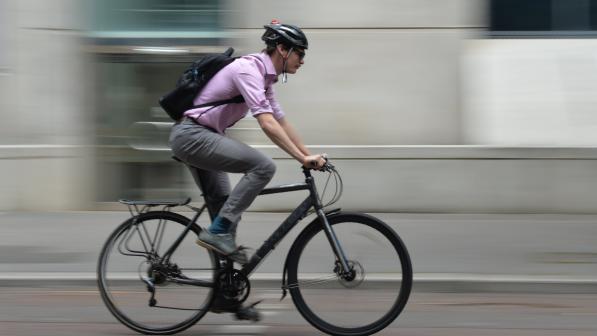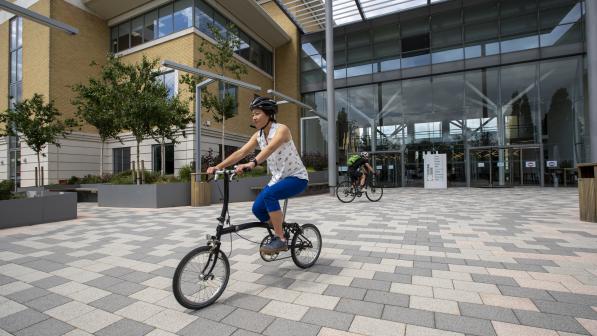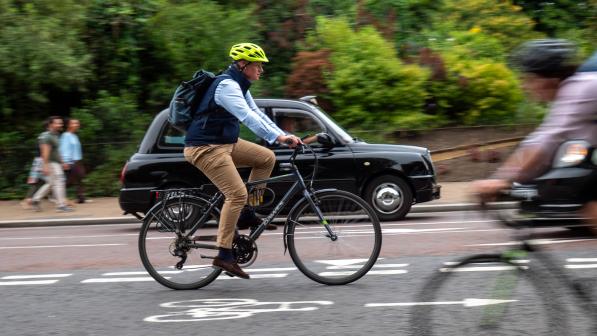Employers must do more to encourage active travel to work, says charity Cycling UK

- 43% of young people in Britain (18-24-year-olds) who said they expect their transport costs to rise are considering changing their method of travel
- According to Cycling UK, employers need to do more to support cycling and walking to work to ease the financial burden of commuting and enable healthier lifestyles. Active travel comes with many benefits to businesses, including increased productivity, better staff retention, lower costs and lower environmental impact
- Results available for download
As the UK celebrates Bike Week (6-12 June 2022), Cycling UK, the UK’s cycling charity, tells employers they must do more to encourage active travel.
New research carried out by YouGov on behalf of Cycling UK published today, Monday 6 June, shows 43% of young people (18-24-year-olds) are considering changing their method of travel due to expected increases in transport costs.
There are still lingering perceived barriers to cycling, and employers can play a key role in making it a realistic and practical option for their staff. It’s a win-win solution
Sarah Mitchell, CEO at Cycling UK
Sarah Mitchell, Cycling UK’s chief executive, says:
“People should be considering cycling as a cost-effective way to commute shorter journeys. The upfront investment, even with e-cycles, soon pays for itself when you consider how much you are saving at the petrol pump.
“However, there are still lingering perceived barriers to cycling, and employers can play a key role in making it a realistic and practical option for their staff. It’s a win-win solution; companies can attract the best young talent while enjoying better staff retention and productivity. At the same time, it eases the financial burden on workers, who no longer need to pay to go to the gym yet will feel happier and healthier.”
The findings are published as the reduction in disposable income forces households to tighten budgets and workers are forking out a greater proportion of their income simply to get to work.
A staggering 81% of respondents across all age groups are expecting their transport costs to increase over the next six months. Of these, 18-24-year-olds are the most likely to be considering alternatives (43%), including active travel.
Fuel price rises are likely to hit young people the hardest as they are entering the workforce, studying or training and are typically on lower incomes. ONS figures for 2021 show 18-21-year-olds in the UK had average (mean) earnings of £12,275 annually, and the 22-29 age group earned an average of £25,997 per annum. This is in contrast with £31,447, the average annual pay for the population as a whole.
According to Cycling UK, the new YouGov figures reflect young people’s concerns but there are measures that employers can take to mitigate the financial stress.
When respondents who said they do not currently cycle to work were asked about specific changes that would encourage them to do so, 37% of young people (18-24( were more likely to do so if their workplace offered improved facilities, such as bike storage and lockers. Over a third of the same group (36%) also said they’d be more likely to cycle to work if their employer offered financial help to buy a bike, and 29% if their workplace offered a cycle to work scheme.
Robert Dunn, climate scientist at the Met Office, said:
“We know that a healthy workforce is more productive, and cycling is a fantastic mode of transport to help reduce your impact on the environment. Being part of the Cycle Friendly Employer accreditation scheme aligns closely to the values of the Met Office, helping our staff to thrive whilst also assisting a lower carbon and lower cost choice of transport.”
The Intellectual Property Office’s chief executive Tim Moss said:
“The benefits of exercise for physical and mental wellbeing are well-documented. We want the IPO to be a brilliant place for our people to work, and being part of the Cycle Friendly Employer scheme helps us support those who wish to travel in an active way. Cycling brings a range of health and environmental benefits as well as helping reduce travel costs. We are delighted to work with Cycling UK to help encourage our staff to cycle, through our Cycle to Work Scheme and cycle-friendly policies and facilities at the IPO”.
Cycle Friendly Employer accreditation is an internationally recognised benchmark for active travel culture and infrastructure in the workplace. In England, Wales and Northern Ireland it is awarded by Cycling UK.
Checking if your workplace is eligible to become a Cycle friendly Employer is easy.
If your business:
- Promotes a cycle friendly culture by building enthusiasm and confidence through groups, events or challenges
- Has cycle friendly infrastructure, such as cycle parking, lockers and showers
- Has cycle friendly policies, such as flexible working hours and Cycle to Work scheme
Then you might already be a Cycle Friendly Employer.
Notes to editors
- Cycling UK, the UK’s cycling charity, imagines a world where the streets are free of congestion and the air is clean to breathe, where parents encourage their children to cycle to school and everyone shares the exhilaration of being in the saddle. For more than 140 years, we’ve been making our streets safer, opening up new traffic free routes and inspiring more people to cycle more often. www.cyclinguk.org
- All figures, unless otherwise stated, are from YouGov Plc. The poll was taken by YouGov in late March on behalf of Cycling UK. A total of 1,744 adults (18+) in the UK were asked if they expected their transport costs to change in the next six months and, if so, whether they were likely to change how they travel. Fieldwork was undertaken between 12th - 14th March 2022. The survey was carried out online. The figures have been weighted and are representative of all UK adults (aged 18+).
- The YouGov poll is available for download
- Data on average annual earnings in the UK in 2021 is from the Office for National Statistics: https://www.ons.gov.uk/employmentandlabourmarket/peopleinwork/earningsa…
- For more information about the Cycle Friendly Employer Accreditation scheme visit: https://www.cyclinguk.org/cyclefriendlyemployer
- Cycling to work is linked with a 45% lower risk of developing cancer, and a 46% lower risk of cardiovascular disease (CVD), compared to commuting by car or public transport. It is also estimated that sickness absence costs UK business around £29bn annually. Research shows that cycle commuters take one day less sick leave on average per year, saving UK business around £83m. https://www.cyclinguk.org/campaigning/views-and-briefings/health-and-cycling
Press contact information
For more information, please contact the national Cycling UK press office. Due to the restrictions caused by the coronavirus outbreak, currently the main press office number (01483 238 315) is not being monitored. If you would like to speak to a member of the press office during working hours (0900 - 1700) please email [email protected] or call 07786 320 713.



